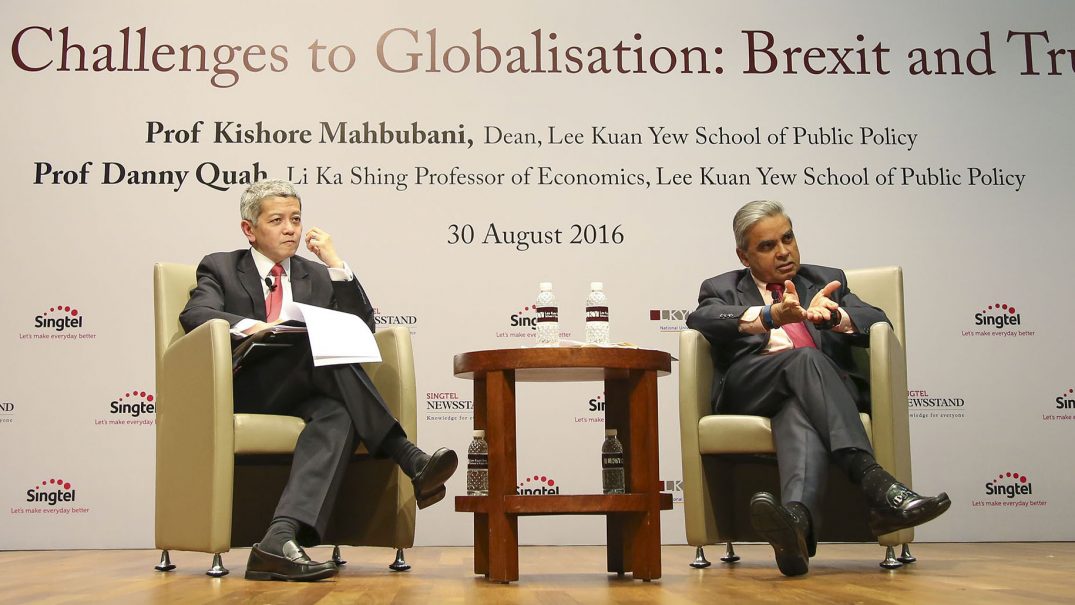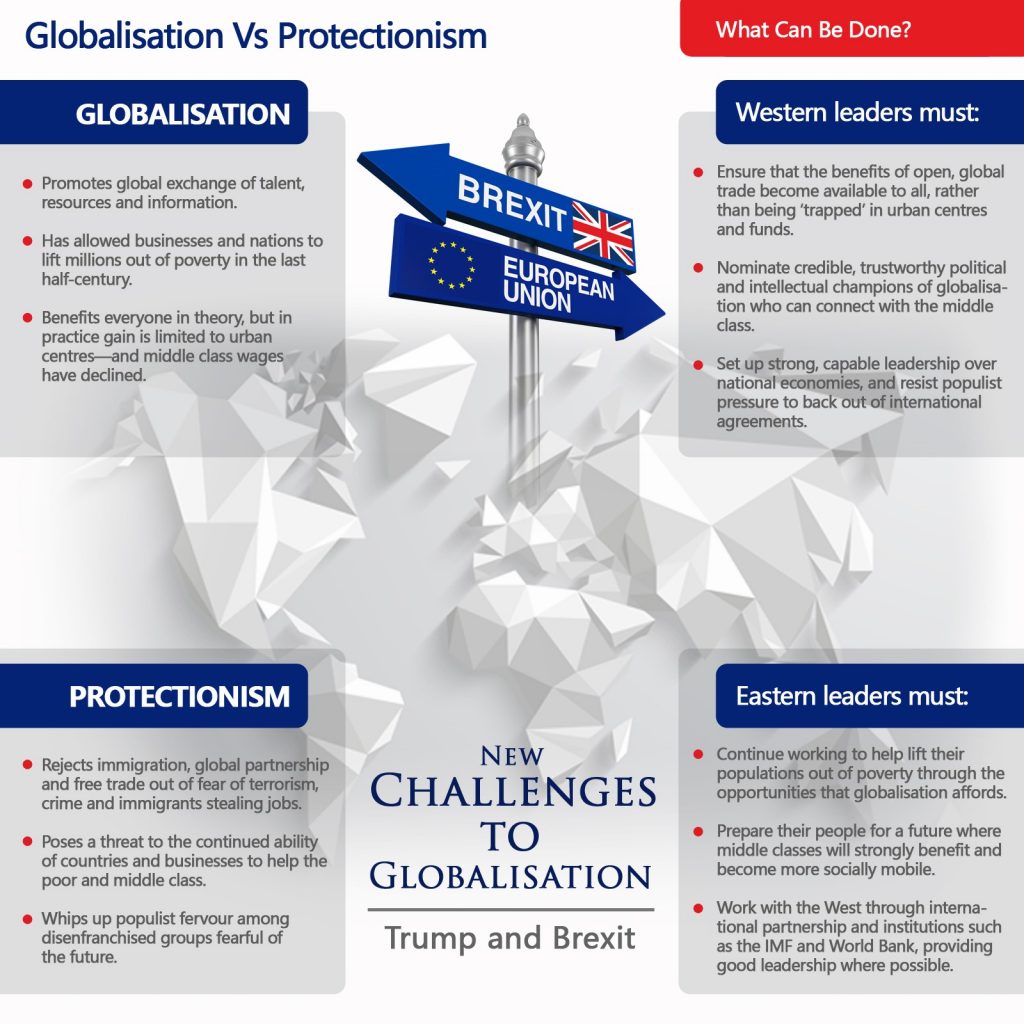
The nomination of Donald J Trump as the Republican presidential candidate, and the departure of Great Britain from the European Union (EU), are two of the most disturbing events of 2016. Both are rejections of globalisation and cooperation between
nations and economies, and pose a threat to the win-win solutions that increased trade and global opportunities have offered to people all over the world. All of this is at risk today. In the economic centres of the West, the great divide is no longer
between Left and Right, but between globalised and protectionist systems; between connection and disruption. And if protectionism wins in large economies like the US and UK, globalisation and much of this interconnected world, especially Singapore loses.
What can be done to manage these new challenges? This was the question that Professors
Kishore Mahbubani (Dean of the Lee Kuan Yew School of Public Policy, or LKYSPP) and
Danny Quah (Li Ka-Shing Professor of Economics at LKYSPP), sought to answer at a
public lecture held on 30 August 2016.
The lecture also saw the official launch of a new partnership between LKYSPP and SingTel. The new
Singtel Newsstand service is a news portal in collaboration with multiple media platforms.
LKYSPP will also contribute articles to the portal, allowing their curated content to reach out to a wider audience. We didn't advertise this event, admitted Prof Mahbubani to a capacity crowd. But it must've struck a chord.
Globalisation Has Its Costs
Prof Quah opened with a story from his time living in the UK. When he was in Asia to give a public lecture, he explained how the world's economic centres were departing from the West and moving east to Asian global cities specifically, from GMT (London)
to GMT +8 (Asian cities such as Hong Kong and Singapore). After the lecture, a throng of Asian professionals and academics came up to talk with him on stage. At first, he was excited at the attention his topic was receiving until the first question came
from a high-powered couple. What do we have to do to make sure our daughter gets into a top US university? they asked. They were still thinking of the US as the best place in the world to study for high returns! The West was where they had decided to
shift their assets, and they weren't going to abide by talk of the West's decline. If their daughter stayed on, it would be America that her work would benefit, the American government that her taxes would support, and American companies that she would
work for. But there was a deeper lesson. Globalisation is a force that businesses and nations piggyback' on for international growth and development. For a half century, Singapore has moved up the value chain through it, and China has lifted over 60 million
people out of poverty. Billions of people (like that couple and their daughter) look to the global marketplace for inspiration, hope and ideas for living a better life for themselves. Globalisation, whatever its flaws, pays off incredibly well. But because
perception matters as well, it is under a powerful, unique threat today.
Why Do Trump and Brexit Matter?
Prof Quah noted that Donald Trump's philosophy puts him firmly in an anti-globalisation protectionist camp; he is like a Dementor in the
Harry Potter books, draining the life out of global markets. He has sucked confidence out of the global
trading system; and also threatened to block or abandon trade deals and take America, the world's largest economy, out of the World Trade Organization. His plans (if implemented) would be catastrophic to international partnerships. Yet he has grown incredibly
popular among segments of the American population; and it is almost immaterial whether he wins the presidency or not, as the damage has already been done. In Great Britain, protectionism reigned supreme as over half its population voted to leave the EU.
Hate crimes against minority groups rose 42 percent in the immediate wake of Brexit, and unleashed social problems once thought lost to history. There's a peculiar, if undeveloped, logic to Trumpist and Brexit thinking. For decades, middle class wages
in the West have been declining absolutely, despite great economic growth in the US and UK. This is because it has accrued entirely to London and to real estate owners and holders of pension plans. In the country as a whole, outside London, towns today
are as badly off as they were in 2009, after the worst ravages of financial crisis. This is why, for many in the US and the UK, the win-win rhetoric of globalisation rings hollow when people do not see the benefits, and instead experience a drop in their
standards of living. Protectionism resonates with the suburban middle class because globalisation's win-win narrative casts them as losers creating opportunities for populists to exploit, both on the left and the right.

Darkness and Intolerance
According to Prof Quah, Trump and Brexit's backers are united in painting a dark, intolerant picture of what the world has become, and claim to care about the concerns of ordinary people such as resources, jobs and space threatened by immigrants, and
remote fears like increased crime and terrorism. Leaving the openness of the EU is an ironic decision for the UK, the country that pioneered free, open global trade. On the other hand, Trump's isolationism is actually a development of a US tradition dating
back to the 1800s, and shared by many of its greatest presidents, including George Washington, Thomas Jefferson and Franklin D Roosevelt. But world trade has changed and brought far more immigrants to American shores since their time and Trump's camp goes
even further. Trade and migration don't work, he insists, because they displace more deserving Americans from their jobs, and anyway each new immigrant is a potential terrorist. Trumpist rhetoric strikes a chord with people in fear for the future of their
country, and who feel that they are powerless to change their situation. There has indeed been disproportionate gain to the already well-off, but the immigrants that Trump blames are just as much victims of this as his supporters!
What Can Be Done?
Prof Quah concluded with three key approaches:
- Recognise that perception matters. The incoherence and poor logic of Trump's thought are irrelevant as long as people believe that he is going to solve their problems. We need to acknowledge that globalisation needs
to be managed well, so that everyone benefits. This is why political discourse, research and journalism need to highlight the win-win gains that globalisation makes possible.
Once people are more aware of those benefits, and stop disengaging their own lives from mainstream political and intellectual discourse, the illogical arguments of Trump and the Brexit movement will have far less appeal.
- A credible, trusted figure needs to emerge onto the world stage. Like President Bill Clinton, he or she must truly be able to communicate and feel the pain of the disenfranchised, and help them into the mainstream of economic
growth so that they share in its benefits.
- Capable leadership is needed to manage the impact of globalisation outside of where its success has most strongly taken hold. Left and right agree that the advantages of globalisation far outweigh its costs, but governments
need to manage the downsides as well to ensure that no one gets left behind.
He concluded that if the West does not provide that leadership, someone else (like the rising economic powers in Asia) will.
Closing Remarks
Prof Mahbubani took the stage to close the lecture with his own observations.
- There is a major challenge in that globalisation's greatest champions the academics in institutions like Harvard, Stanford and Yale are losing faith in it, while its opponents grow in power and conviction. Why has this happened,
to the extent that Trump and Brexit's success have become reality?
- Someone will implement some form of globalisation, whatever happens. But to reduce protectionism's influence, globalisation needs dynamic, honest and capable champions.
- The West has grown schizophrenic. Because of populist pressure, even better-informed leaders like Hillary Clinton are seriously thinking of walking away from important agreements like the Trans-Pacific Partnership
(TPP). That is an even greater danger than Trump!
On the whole, the West has failed to prepare its own populations for the consequences of globalisation and its own decline, and is losing control over key institutions like the IMF and World Bank. Yet it will not release its nominal power over the global
economy, and adjust to new realities.
- Responsibility has shifted to Asia. In the coming decades, Asian countries will be globalisation's greatest beneficiaries, and are set to have the greatest increase in middle-class wealth in history. We need to be prepared
for this, and not coast by thinking that nothing will change.
- This is critical for Singaporeans. Our nation stands to gain the most from globalisation, as we're by far the most open and globalised economy in the world. On the other hand, if something goes wrong with globalisation,
Singapore is vulnerable in a way that other economies are not.
Prof Mahbubani concluded that the key focus needs to be on confronting the protectionist camp's narrative, by making the strengths of global partnership clearer to the ordinary Singaporean in the street.